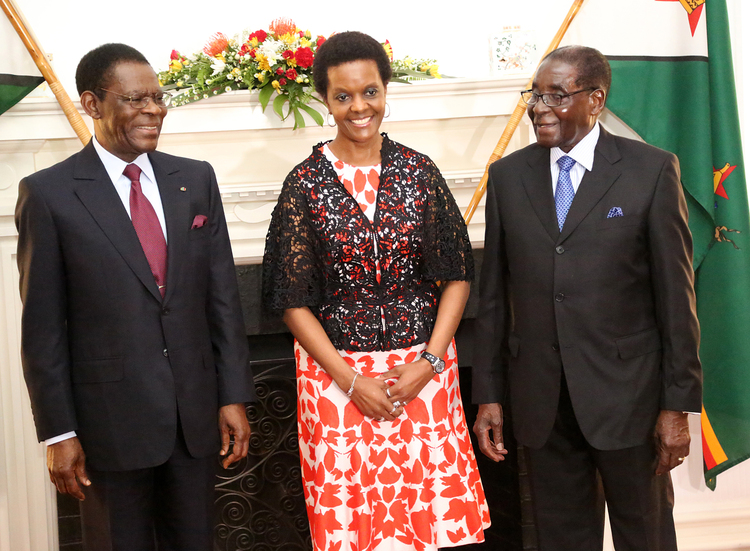
The Sunday Mail

President Mugabe has revamped the way the African Union does things by introducing a host of processes and decision-making systems that ensure the bloc’s effectiveness in addressing issues affecting the continent.
During his tenure – which ends this week when he hands over the AU Chairmanship to Chad’s President Idriss Déby Itno at the 26th Summit in Addis Ababa, Ethiopia – President Mugabe steered the grouping to achieving financial autonomy by enhancing internal resource mobilisation.

President Mugabe shares a lighter moment with his Equatorial Guinea counterpart President Teodoro Obiang Nguema Mbasogo in the presence of First Lady Amai Grace Mugabe at State House in Harare yesterday. — Picture: Believe Nyakudjara
The President, the most senior statesman in Africa, leaves a lasting impression courtesy of vast leadership experience. He is the only leader who was present at the formation of the AU’s predecessor, the OAU, in 1963.
Under his watch, the AU, implemented a plan to enhance domestic financing with some members increasing their financial contributions. It was under President Mugabe that the AU streamlined working methods at summits, breathing new life into a process that had become mundane.
The outgoing AU chair was also credited for giving the AU’s Agenda 2063, Africa’s 50-year development blueprint, direction when he oversaw a summit at which the first 10-year implementation plan was adopted.
Leveraging on Sadc’s Industrialisation Stragegy, which he was instrumental in getting the region to adopt when he chaired that bloc, President Mugabe got Africa talking about industrial development over the past year.
The President was also at the forefront of peace and security efforts on the continent after overseeing the signing of the peace agreement between Mali’s government and Tuareg rebels; as well as working towards easing tensions in Burkina Faso, DRC, Lesotho, Madagascar and other hot spots.
On health, President Mugabe played an instrumental role in spearheading an international plea to fight Ebola, which ravaged West Africa last year.
The outbreak was eventually contained this year.
Foreign Affairs Minister Simbarashe Mumbengegwi told The Sunday Mail of President Mugabe’s remarkable year in which he chaired both Sadc and the AU.
“There is an erroneous view that these happened as a result of a rotational coincidence; in other words it only happened because it was Zimbabwe’s turn at the same time.
“This, of course, is not correct. It was not Zimbabwe’s turn to chair Sadc, and it was not Zimbabwe’s turn to chair the African Union. No. This happened not by coincidence, but by a conscious decision: first by Sadc that they wanted His Excellency the President to lead our regional organisation at that point in time.
“Then subsequently, it was again by conscious decision of the African Union that President Mugabe should lead the continental body at that point in time, knowing very well that he was already the Sadc leader.
“In other words, this was a conscious desire by both the region and the continent that our President was a leader of such stature that both organisations could benefit tremendously by his leadership, by his guidance, by his inspiration.”
Minister Mumbengegwi said under President Mugabe, the AU made a commitment to finance 100 percent of its operational budget in the next five years – up from the current 40 percent.
In the same period, the internal funding thresholds are set at 75 percent for the programmes budget and 25 percent for the peace-keeping budget.
“Under his chairmanship, he has been able to inspire the continent to accept that we have to tax ourselves a bit more. Member states must contribute more so that we will be able to pay for our programmes and projects.
“So, this was a very important decision for the continent, and it was very much spearheaded by the President, he pushed it through the summit.
“In fact, the current subscriptions for member states have gone up considerably because benchmarks have been determine d to achieve the percentages I have just referred.
“The figures have gone up; in our case we are paying almost double what we used to pay in order to be able to pay more,” Minister Mumbengwi said.
He said President Mugabe brought a refreshing air to AU meetings, which he chaired with wit, poise, intelligence and charm, leaving delegates in awe.
Officials from the Foreign Affairs Ministry said President Mugabe had changed the way business was conducted.
A senior mandarin said: “One of his biggest successes was the streamlining of the working methods of the AU summits and the Union.
“The previous AU summits would just commence with the opening ceremony, and this used to take a lot of time, leaving less time for real discussions, especially outstanding discussions amongst the Heads of States.
“We had a problem in that during the old sessions, we would have elaborate sessions and soon after, some Heads of States would fly away or use the opportunity of the summit to hold bilateral talks.
“Now what is happening is that as soon as they get in, they go into a closed session, where Heads of States discuss strategic issues related to Africa.
“This is what happened during the summit in South Africa in June last year and member of states actually were in agreement that it gives them time to make the agenda leaner, it confines certain issues strategic issues so that administrative matters are handled by the Ministers and Permanent representatives.
“Then you will have the specialised technical committees at Ministerial level and permanent representatives discussing some of the technical and laborious issues.”
President will convene his last meeting as Chair when Heads of State and Government meet in Addis Ababa on January 30 and 31.



